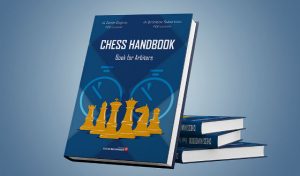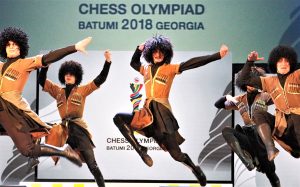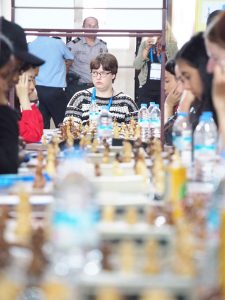What is an Arbiter, why would you want to be an arbiter and how do you become and arbiter? We hear it quite frequently, so today we answer all your questions with an interview with Australia’s very own Female International Arbiter Alana Chibnall!

Tell us a little about yourself
I live in Canberra ACT and have most of my life. I have been playing chess since I was about 11 years old in 2003 when I started in Year 6 at Primary School after going to an interschool competition. I hold the Women’s FIDE Master (WFM title) which I won last year in a competition in Auckland.
I am an International Arbiter (IA – the highest arbiter title in chess) and the only active female IA in Oceania (and I think the fourth female IA in Australian history).
Outside of chess, I have just finished my Bachelor of Information Technology (IT) at the University of Canberra, and I am starting a Graduate position with the Department of Defence in Canberra in February next year. Yay for Government jobs!
How long have you been an arbiter?
I’m not sure when I started being an arbiter, but it would have been about 2008/2009 when I was in Year 11 or 12 at school. I was playing a lot of chess with my junior chess league in Canberra and started showing interest in helping run some of the younger events which I wasn’t eligible to play in. I think I did an Under 10 Championship with another person as my first event and have gone from there. I have been an International Arbiter since September 2016.
What is an arbiter?
An arbiter is basically the chess equivalent of an umpire or referee in other sports. We keep an eye on the games of chess in progress and step in if we get called over or see something wrong in a game. Arbiters must make decisions based on the current Laws of Chess using our judgement based on the evidence we have from the game.

Arbiters are also required to do other jobs for the event such as setting clocks, putting out scoresheets, entering results of games and generating the pairings for the next round using a computer program, printing out pairings, standings and cross tables to keep players informed of what is happening in the tournament and making announcements.
Local tournaments usually only have a very small number of arbiters, so they end up being responsible for a lot of games at once. At the top-level international events, such as the World Championship or World Chess Olympiad, arbiters are usually only expected to look after 1-4 games at once.
How do you become an arbiter?
The best way to become an arbiter is to go up to the arbiter at your local club or tournament and say you are interested in becoming one! For events which are only Australian rated, you don’t need to have any qualifications – just a general knowledge of the laws of chess and rules of the type of tournament it is (or a willingness to learn them). Arbiters are generally willing to train others and most states and territories have at least 3-4 who can be called on to run events.
There are different arbiter titles for those who want to work at more events, which are National Arbiter (NA), FIDE Arbiter (FA) and International Arbiter (IA). The requirements are different depending on the title, with FAs and IAs having to pass a 3-hour examination about the laws of chess.

Why would you want to be an arbiter?
A lot of people become an arbiter for many reasons. Often, arbiters are players who have volunteered to help at their local club or tournament, or parents who have decided they have nothing better to do and are bored! This is the case of one of the top IA’s in New Zealand, who has admitted that he hates the game but only started doing it because he was bored waiting for his son to finish.
In my case, becoming an International Arbiter has given me opportunities to travel both interstate and overseas that I wouldn’t have had otherwise. I’ve been an arbiter overseas in Thailand, New Zealand and Georgia.
Do you have to know chess to become an arbiter (can a parent become an arbiter?)
To be able to be an arbiter, you do need to know the rules of chess, but you’re generally not required to be a good player. To get started, arbiters usually only need to know how the pieces move (and what an ‘illegal move’ is) and what the different chess terms mean (e.g. check, checkmate and castling). All of these are easy to learn and not much else is required for lower level tournaments (e.g. younger junior events and interschool tournaments).
Depending on the type (and
strength) of tournament the rules can be slightly different, so it is important
for arbiters at higher events (especially anything FIDE rated) to understand
what rules are used in what situations. Arbiters at higher events are expected
to have a very good understand of the laws of chess, so they can make decisions
quickly and soundly when required.
What has been your most amazing arbiting experience?
I have had a lot of great experiences since becoming an arbiter, but my favourite so far was probably when I was selected as the only Australian representative at the World Chess Olympiad this year in Georgia.

The World Chess Olympiad, for those who don’t know, is the biggest chess event in the world. Players compete in teams of five (four players plus one reserve) representing their countries. In the event this year there were 180 different countries competing in the Open and 146 competing in the Women’s.
I was a Match Arbiter, so I was responsible for looking after one match of four games of chess each round. Through this, I got to see players from all over the world compete.

I have of course had many other arbiting experiences which have been highlights, such as working in Thailand at the Bangkok Open and being an arbiter at the Australian open twice.